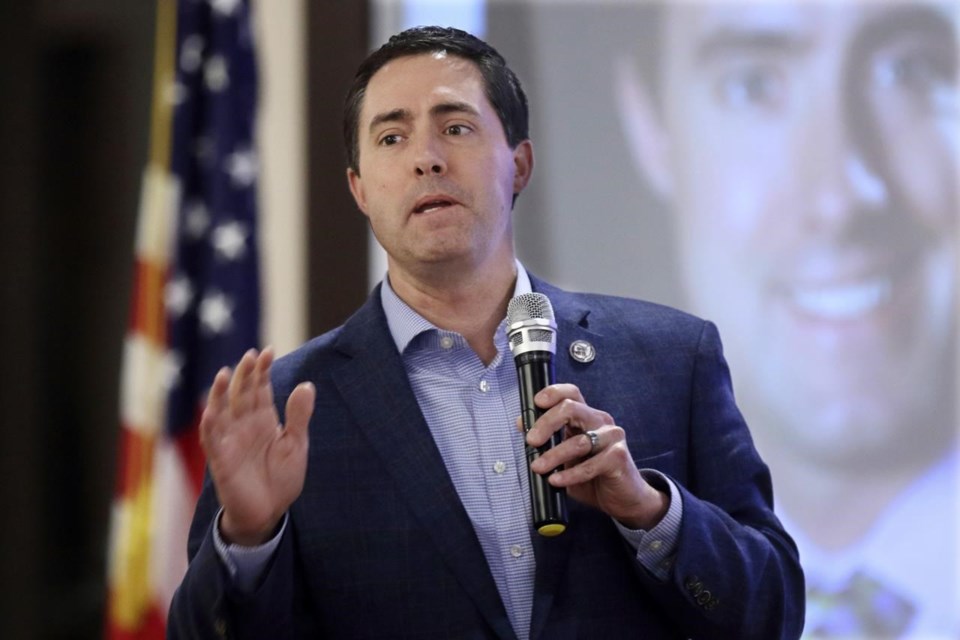COLUMBUS, Ohio (AP) — Ohio's Republican elections chief on Wednesday announced a new public integrity unit in response to what he called Americans' “crisis of confidence” in the electoral process even while acknowledging the state's reputation for secure voting.
The unit, taking effect next week, will consolidate and highlight the Ohio secretary of state's investigative work and eventually have one or more dedicated investigator, Secretary of State Frank LaRose said in a statement. Those investigators won't start until after the General Election, however.
He referenced a growing national trend “that indicates a crisis of confidence in the electoral process.”
That crisis is largely a concern of Republican voters and stems from lies told by former President Donald Trump about election fraud in the campaign won by Joe Biden.
Numerous federal and local election officials in both parties, a long list of courts, top former campaign staffers and even Trump’s own attorney general have all said there is no evidence of the election fraud the former president alleges.
For his part, LaRose initially said the 2020 election was secure and accurate, but as last spring's primary neared — which LaRose won, defeating a 2020 election skeptic — he began to echo some of Trump’s talking points.
LaRose claimed there were problems in other states and touted his office’s work to combat voter fraud. Trump endorsed LaRose, a longtime supporter.
LaRose said his new division will help his office more efficiently and thoroughly do work it already does, such as voting system certification and investigation of election law violations, including a team dedicated at looking into rare cases of voter fraud or suppression and campaign finance violations, said LaRose, who is seeking a second term in November.
“Our elections are being scrutinized like never before, and any lack of absolute confidence in the accuracy and honesty of those elections weakens the very foundation of our democracy,” LaRose said in a statement.
He also referred to Ohio's “strong national reputation for secure, accurate, and accessible elections.”
LaRose's announcement follows a decision in Florida in which lawmakers and Republican Gov. Ron DeSantis created a police force dedicated to pursuing voter fraud and other election crimes.
Democrats called LaRose's news a waste of taxpayer dollars aimed at bolstering his political aspirations. LaRose's name is often mentioned as a possible 2024 U.S. Senate candidate.
In a referral of 11 individuals for possible election fraud in August, LaRose identified just a single case of possible illegal voting, said party spokesperson Matt Keyes, making the new office “a taxpayer-funded solution to a problem that doesn’t exist.”
In fact, in a series of referrals since 2019, LaRose identified at least 548 cases of potential election fraud violations it referred to prosecutors, his office said. LaRose has acknowledged that cases of election fraud are a tiny fraction of overall votes cast in Ohio.
Chelsea Clark, LaRose's Democratic opponent, questioned the timing of the announcement. She also noted LaRose's efforts to keep his other opponent, independent candidate Terpeshore Maras, off the ballot. Clark called out LaRose for a “history of politicizing these investigations to punish opponents.”
Maras is a conservative podcaster who embraces Trump’s lies about the 2020 election. Last month, the Ohio Supreme Court ruled her eligible to run for Ohio secretary of state this fall.
In August, LaRose's office had upheld a judge's decision that a number of Maras' petition signatures were invalid, and invalidated her candidacy, a move overturned by the state Supreme Court.
Maras dismissed the move as pre-election posturing.
If elected, she wouldn't need such a unit, because “everyone employed in our office already has some delegated part in ensuring each Ohioan has a single secure vote that is properly counted – nothing more and nothing less," Maras said.
___
Associated Press writer Kantele Franko in Columbus contributed to this report.
___
This story was first published on October 5, 2022. It was updated on October 6, 2022 to make clear that since 2019, the Secretary of State’s office identified at least 548 cases of potential election fraud violations that it referred to prosecutors.
Andrew Welsh-huggins, The Associated Press


